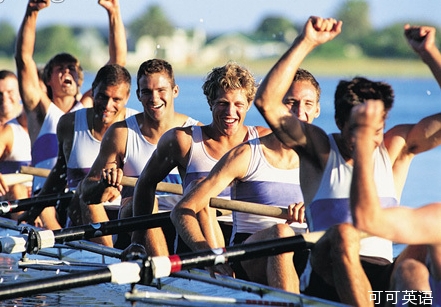
SIBLING rivalry has many famous examples. Cain and Abel, Linus and Lucy, Liam and Noel. Less well-known, but no less competitive, are David and James Livingston, two brothers who, in April 2003, raced on opposite sides in the Oxford and Cambridge University Boat Race, one of the toughest sporting challenges in the world.
兄弟德比战有许多出名的例子。例如,该隐和亚伯[1],莱纳斯与露西[2],连恩与诺尔[3]。大卫和詹姆士?李维斯通兄弟俩之间的纷争虽没有这么出名,但是在激烈程度上毫不逊色。2003年4月,两人在牛津剑桥划船比赛中互为对手。牛津剑桥划船比赛也是世界上竞争最激烈的体育挑战项目之一。
“Blood Over Water”, published to coincide with the 155th boat race on March 29th, tells in alternating narratives the story of how the brothers’ quest for victory turned them into enemies. Providing context is the broader tale of the historic rowing competition between two prestigious universities.
《水上血战》于3月29日出版。此时正值第155届划船比赛。该书以交叉叙事的方式讲述了兄弟俩在追逐胜利的过程中反目成仇。故事背景设在两所久负盛名的学校间的传统划船比赛中。
The first boat race took place in 1829 on the River Thames at Henley in Oxfordshire and was the culmination of an idea of Charles Merivale, a Cambridge student, and his Harrow schoolmate Charles Wordsworth (nephew of poet William), at Oxford. The event was such a success—newspapers of the day reported crowds of 20,000—that Henley decided to organise its own (now famous) regatta and the boat race moved to Westminster in London. By 1845, with Westminster too crowded, the race moved up river to Putney. Today it still runs four-and-a-quarter miles (6.8km) from Putney to Mortlake and, despite being in the public eye for just one day each year, attracts a global audience of around 120m.
首届划船比赛于1829年在牛津郡泰晤士河的亨利街(Henley)举行。这个主意来自剑桥学生查理斯?梅里瓦尔和他同样来自哈罗区的牛津大学的同学查理斯?沃兹沃斯(诗人威廉的侄子)。赛事非常成功,当天的报纸报道有两万观众。于是,亨利街决定自己组织赛舟会(现在已经很出名了)。划船比赛则移到了伦敦的西敏斯特(Westminster)。到1845年,西敏斯特也人满为患,比赛又转至泰晤士河上游普特尼(Putney)。现在的比赛依然是从普特尼到莫特莱克(Mortlake)长为6.8公里(4.25英里)的比赛。虽然出现在公众面前的比赛一年只有一天,但比赛依然吸引了全球大概一亿两千万的观众。
Training is brutal. For seven months potential crews (each with eight oarsmen and a cox) undergo two intense sessions every day, one on the water and one on indoor rowing machines or ergometers. Over that time they put in two hours’ work for each of the 600 strokes they will take in the race. As they train, hearts race at over 200 beats a minute; lactic acid builds to stinging levels in muscles; fragile capillaries burst in the lungs. To combat the physical demands made on them oarsmen must consume 6,000 calories a day, more than twice the normal daily requirement for men. All of this must be balanced against the demands of tutors, supervisions, essays, exams and long-suffering girlfriends.
训练是残酷的。准队员们(每个队有八名桨手和一名舵手)在几个月内每天都要经历两轮高强度的集训。一轮在水上,一轮在室内划船机或测力计上。在两个小时的训练中,他们要为比赛中的600次划桨的每一次而努力。训练过程中,心跳超过每分钟200次;乳酸在肌肉里聚集到酸痛的程度;肺里脆弱的毛细血管都会破裂。为了适应桨手身体需要,他们每天要消耗6000卡路里,这比常人每日消耗的两倍还多。所有这些训练还要和导师、学监、论文、考试以及消耗长期时间精力的女朋友等进行平衡。
“Blood Over Water” stands out from the mass of sporting memoirs thanks to the authors’ open portrayal of their relationship as the build-up to the race intensifies. David, the younger by three years, speaks unashamedly of his struggle to keep up with the high-achieving James, his emotions swinging from pride and love to envy and hate. James dreads failure and is consumed by the fear that his kid brother might beat him at his chosen endeavour. As race day approaches the two opposing camps eat meals at opposite ends of the family kitchen, communication is reduced to curt nods, and the feeling of brotherhood is replaced by one of hostility.
由于《水上血战》作者对比赛推进过程中两人关系激化的坦然描述,所以这本竞技传纪能在众多同类书目中脱颖而出。年幼三岁的弟弟大卫,谈到他用尽各种手段追赶他成绩突出的哥哥詹姆士,一点也不害臊。他的情感倒是一直都在尊严与爱和嫉妒与恨之间摇摆。詹姆士害怕失败,因为担心他小弟想尽一切办法打败他而心力交瘁。随着比赛日期的临近,交战双方在自家厨房的两头吃饭,交流只剩下草草的点头,兄弟情谊也已转变成了敌对情绪。
The irony of it all is that when Oxford wins the race, by one foot—a 0.0043% difference over the length of the course and the smallest margin on record—the younger man’s joy is tinged with guilt at taking away his brother’s dream. Proof indeed, that blood is thicker than water.
最具有讽刺意义的是,当牛津大学以领先一英寸的微弱优势——这只占全程比赛的0.0043%,而且也是有史以来的最小差距——赢得比赛时,弟弟胜利的喜悦夹杂着夺走哥哥梦想的负罪感。事实再次证明,血浓于水。













